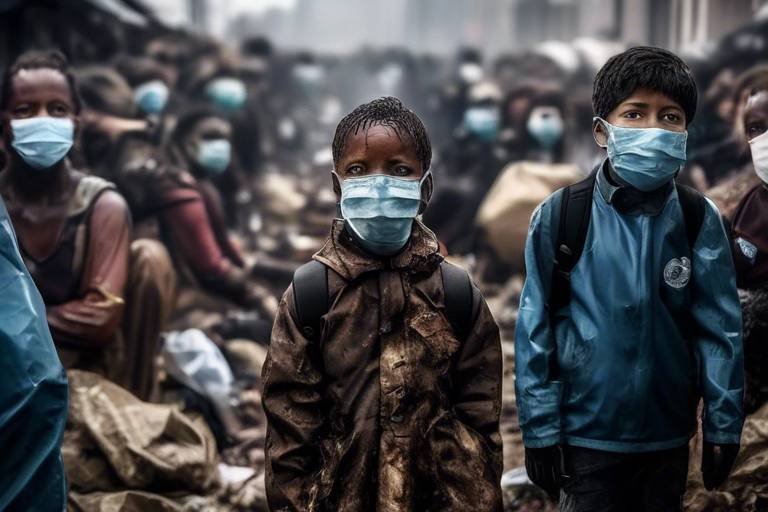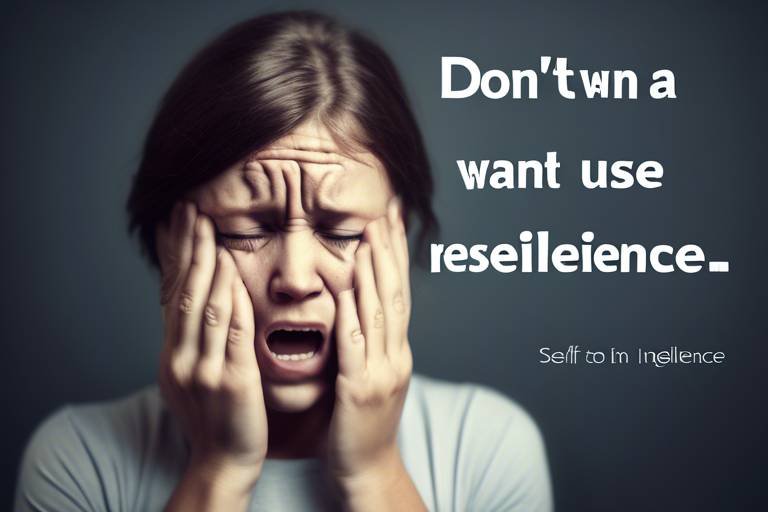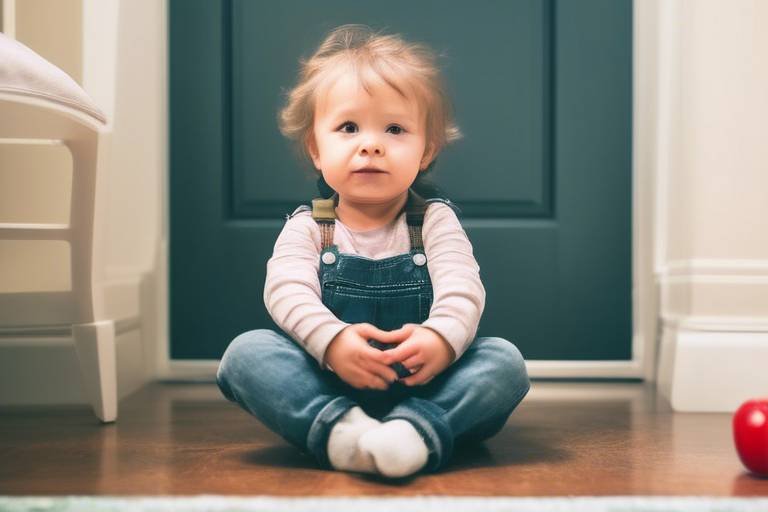Role of Resilience in a Post-Pandemic World
In the wake of the pandemic, the concept of resilience has taken center stage as individuals and communities strive to navigate the complexities of a new reality. The ability to bounce back from adversity is more than just a buzzword; it’s a vital skill that can help us face the challenges that life throws our way. Think of resilience as a rubber band—it stretches under pressure but ultimately returns to its original shape. In a post-pandemic world, this elasticity is crucial for mental health, emotional well-being, and overall happiness.
As we reflect on the past few years, it becomes clear that resilience is not just about enduring hardship but also about thriving in the face of it. The pandemic has tested our limits, revealing vulnerabilities we may not have known existed. However, it also provided a unique opportunity to cultivate resilience on both personal and community levels. By understanding what resilience truly means and how it manifests in our lives, we can better equip ourselves to handle future adversities.
Resilience is built on several key components: emotional awareness, a positive mindset, strong social connections, and effective coping strategies. Each of these elements plays a crucial role in how we respond to stress and adversity. For instance, emotional awareness allows us to recognize our feelings and understand their impact on our behavior. A positive mindset helps us reframe challenges as opportunities for growth, while strong social connections provide the support we need to navigate tough times. Together, these components create a robust framework for resilience that can be developed and strengthened over time.
Moreover, the pandemic has taught us that resilience is not solely an individual endeavor. Communities can also exhibit resilience through collective action and support. When individuals come together to uplift one another, they create an environment where resilience can flourish. This communal aspect of resilience is particularly important as we move forward, reminding us that we are not alone in our struggles. In fact, the power of shared experiences can significantly enhance our ability to cope with challenges.
As we delve deeper into the importance of resilience, it’s essential to recognize that fostering this quality is an ongoing process. It requires intentional effort and a willingness to adapt. Whether through personal strategies or community initiatives, the journey towards resilience is one worth taking. After all, in a world that continues to change rapidly, our ability to bounce back and thrive is what will ultimately define our success and well-being.
- What is resilience?
Resilience is the capacity to recover quickly from difficulties and adapt well to adversity. - Why is resilience important in a post-pandemic world?
It helps individuals and communities cope with stress, adapt to changes, and maintain mental health. - How can I build resilience?
Practicing mindfulness, nurturing relationships, and developing coping strategies are effective ways to enhance resilience. - Can communities be resilient?
Yes, communities can show resilience through collective support and shared resources during challenging times.

Understanding Resilience
Resilience is more than just a buzzword; it's a vital skill that allows individuals to bounce back from life's adversities. Think of it as a rubber band—when stretched, it may feel uncomfortable, but once released, it returns to its original shape. In the context of a post-pandemic world, resilience is crucial for navigating the emotional and psychological challenges that many of us face. It encompasses a variety of components, including emotional strength, adaptability, and social support, all of which work together to help us cope with stress and uncertainty.
At its core, resilience is about how we respond to challenges. It's not merely about enduring hardship but rather about thriving despite it. This ability is especially important in today's complex landscape, where individuals are grappling with the lingering effects of the pandemic. The psychological toll has been immense, and understanding resilience can empower us to reclaim our lives and foster a sense of normalcy.
So, what exactly contributes to resilience? Here are some key components:
- Emotional Awareness: Recognizing and understanding one's emotions is the first step toward building resilience. This awareness allows individuals to process their feelings rather than suppress them.
- Positive Relationships: Having a strong support network can make all the difference. Friends, family, and community connections provide emotional support and practical help during tough times.
- Problem-Solving Skills: The ability to think critically and creatively about challenges enables individuals to find solutions rather than feeling overwhelmed.
- Self-Efficacy: Believing in one's ability to overcome obstacles fosters resilience. This belief can be cultivated through past experiences and successes.
Why is resilience particularly crucial in a post-pandemic world? The pandemic has disrupted our lives in unprecedented ways, leaving many feeling isolated and anxious. Those who possess resilience are better equipped to handle such disruptions, allowing them to maintain a sense of hope and purpose. It helps individuals not only to survive but to thrive as they adapt to new realities.
In summary, resilience is a multifaceted concept that encompasses emotional strength, social connections, and problem-solving abilities. By understanding these components, we can take proactive steps to cultivate resilience in ourselves and our communities. This journey is not just about recovering from setbacks; it’s about emerging stronger and more capable than before. The post-pandemic world may be filled with uncertainties, but with resilience, we can navigate these challenges with confidence and grace.

The Psychological Impact of the Pandemic
The COVID-19 pandemic has been a tumultuous ride for everyone, leaving an indelible mark on our mental health. As we navigated through lockdowns, social distancing, and uncertainty, many found themselves grappling with emotions they had never experienced before. The world turned upside down, and suddenly, our routines were disrupted, our social connections strained, and our sense of safety shattered. The psychological impact has been profound, affecting individuals across all walks of life.
One of the most significant challenges has been the surge in stress and anxiety. According to various studies, there has been a noticeable increase in mental health issues during the pandemic. People reported feelings of isolation, fear of illness, and financial instability, all contributing to a heightened state of distress. In fact, a recent survey indicated that nearly 70% of respondents experienced increased anxiety levels due to the pandemic.
| Mental Health Issues | Percentage of Increase |
|---|---|
| Anxiety Disorders | 40% |
| Depressive Symptoms | 30% |
| Post-Traumatic Stress Disorder (PTSD) | 25% |
This rise in psychological distress highlights the essential role of resilience in coping with such unprecedented challenges. Resilience is like a mental shield, enabling individuals to bounce back from adversity. It’s not about avoiding stress but rather about learning to navigate through it. Those who harness resilience are better equipped to handle the emotional upheaval brought on by the pandemic.
As we delve deeper into the emotional landscape shaped by the pandemic, it’s clear that stress and anxiety have become the new norms for many. The constant barrage of alarming news and the uncertainty surrounding the future have left many feeling overwhelmed. But here’s where resilience steps in like a superhero, helping us devise effective coping strategies to manage these feelings. It’s crucial to understand that while anxiety might feel like a storm, resilience allows us to find our inner calm amidst the chaos.
Creating effective coping mechanisms is essential for maintaining mental well-being. Here are some strategies that can enhance resilience:
- Practice Mindfulness: Engaging in mindfulness can help ground you in the present moment, reducing anxiety about the future.
- Stay Connected: Regular check-ins with friends and family can provide emotional support and strengthen your social network.
- Physical Activity: Exercise releases endorphins, which can improve mood and reduce stress levels.
By integrating these strategies into daily life, individuals can develop a toolkit for resilience, helping them manage the psychological impact of the pandemic more effectively.
It’s important to emphasize that seeking professional help can be a game changer in building resilience. Therapy and counseling provide a safe space to explore feelings and develop coping strategies tailored to individual needs. Mental health professionals can offer guidance, support, and techniques that empower individuals to strengthen their resilience. Remember, it’s perfectly okay to ask for help; it’s a sign of strength, not weakness.
In conclusion, the psychological impact of the pandemic is a complex tapestry woven with threads of stress, anxiety, and resilience. By understanding these dynamics, we can better equip ourselves and our communities to heal and thrive in a post-pandemic world.
- What is resilience? Resilience is the ability to bounce back from adversity and adapt to challenging situations.
- How can I improve my resilience? You can improve resilience through mindfulness practices, building strong relationships, and seeking professional support when needed.
- What are common psychological effects of the pandemic? Increased anxiety, depression, and feelings of isolation are common psychological effects experienced during the pandemic.

Stress and Anxiety Levels
In the wake of the pandemic, many of us have found ourselves grappling with heightened levels of stress and anxiety. The uncertainty of the situation, combined with the drastic changes to our daily lives, has created a perfect storm for mental health challenges. It's almost as if we were all thrown into a turbulent sea without a life raft, struggling to stay afloat amidst the waves of worry and fear. But why exactly have these feelings surged? Let's dive deeper.
The pandemic has not only disrupted our routines but has also stripped away the comfort of normalcy. Many people experienced isolation, job loss, or the fear of illness, which can significantly amplify stress levels. According to recent studies, approximately 40% of adults reported symptoms of anxiety or depression during this period. This staggering statistic highlights the widespread impact of the pandemic on mental health.
Moreover, the constant influx of news about the pandemic can act as a double-edged sword. While it’s essential to stay informed, excessive exposure to negative news can lead to what psychologists call “news fatigue.” This phenomenon can exacerbate feelings of hopelessness and anxiety, making it crucial to find a balance in our media consumption.
So, how does resilience fit into this picture? Resilience acts as a buffer against the stressors we face. It enables us to navigate through our emotional responses and emerge stronger from our experiences. When we cultivate resilience, we can better manage our anxiety levels and reduce the overall impact of stress on our lives. Here are some key components that contribute to resilience:
- Positive Thinking: Focusing on the silver linings can help shift your mindset.
- Flexibility: Being open to change allows us to adapt more easily.
- Social Support: Relying on friends and family can provide a safety net during tough times.
As we work towards enhancing our resilience, it's important to acknowledge that seeking help is a sign of strength, not weakness. Whether it’s through therapy, support groups, or simply talking to a friend, reaching out can be a vital step in managing anxiety and stress. Remember, you don't have to navigate this journey alone.
In summary, while the pandemic has undeniably increased stress and anxiety levels, understanding the role of resilience can empower us to cope better. By fostering a resilient mindset, we can not only survive but thrive in this post-pandemic world.
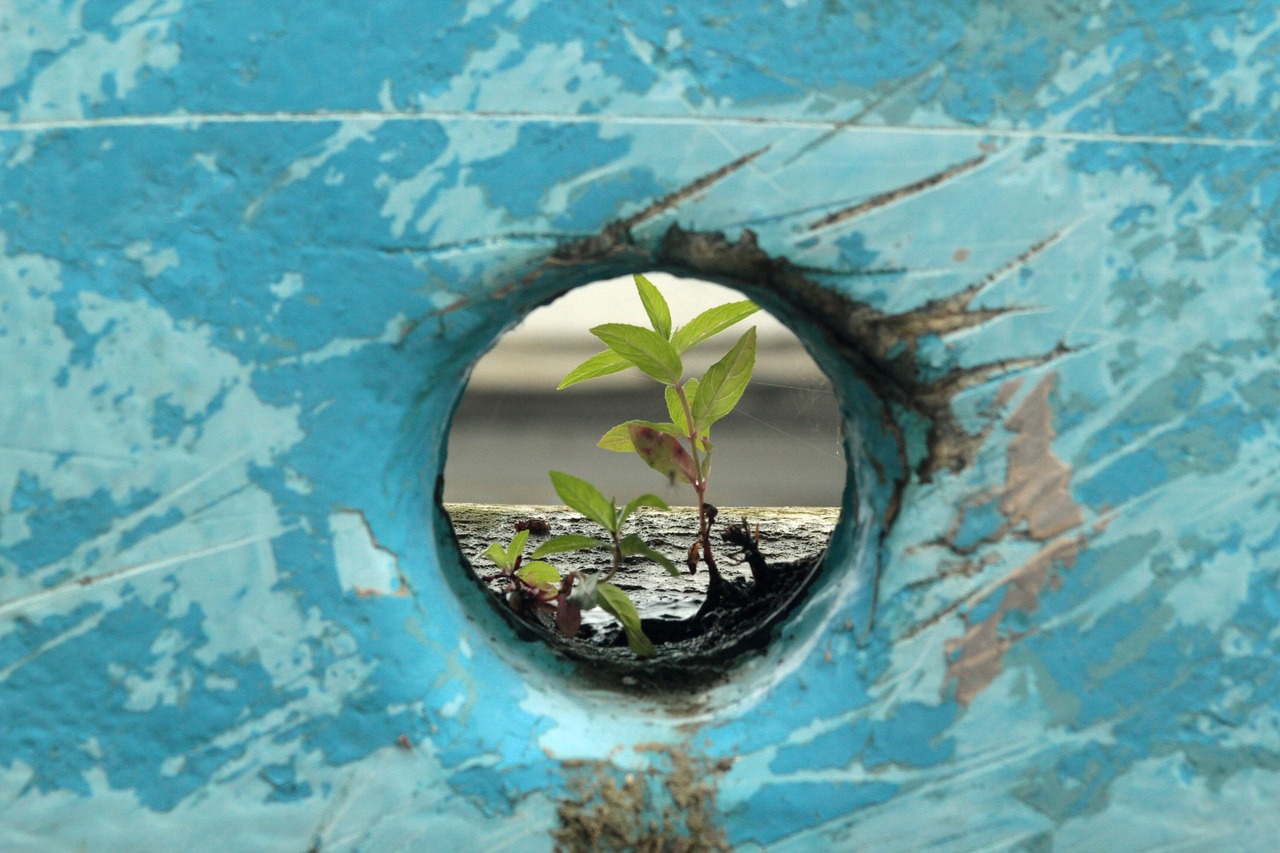
Building Coping Mechanisms
In the aftermath of the pandemic, the importance of building effective coping mechanisms cannot be overstated. As we navigate this new landscape, it's essential to equip ourselves with tools that not only help us manage stress but also enhance our overall well-being. Think of coping mechanisms as your personal toolkit; just like a carpenter wouldn’t build a house without the right tools, we shouldn’t face life’s challenges without strategies to support our mental health.
Coping mechanisms can be broadly categorized into two types: problem-focused and emotion-focused strategies. Problem-focused coping involves tackling the issue head-on, while emotion-focused coping helps manage the emotional distress that comes from the situation. Understanding which type to use in different scenarios is crucial. For instance, if you’re overwhelmed with work, a problem-focused approach might involve creating a schedule to manage your tasks better. On the other hand, if you’re feeling anxious about a future event, an emotion-focused strategy might include practicing relaxation techniques.
One of the most effective ways to build resilience is through mindfulness practices. Mindfulness encourages us to stay present, reducing the tendency to ruminate on past events or worry about the future. Simple techniques such as deep breathing, meditation, or yoga can significantly enhance our ability to cope with stress. For example, dedicating just 10 minutes a day to mindfulness can lead to a noticeable decrease in anxiety levels. Here’s a quick overview of some mindfulness practices you can incorporate into your daily routine:
- Deep Breathing: Inhale deeply through your nose, hold for a few seconds, and exhale slowly through your mouth.
- Meditation: Find a quiet space, sit comfortably, and focus on your breath or a calming mantra.
- Journaling: Write down your thoughts and feelings to process them more effectively.
Another critical aspect of building coping mechanisms is developing strong emotional regulation skills. This involves recognizing your emotions, understanding their triggers, and learning how to express them appropriately. Techniques such as cognitive restructuring can help you challenge negative thoughts and replace them with more positive, realistic ones. This shift in mindset not only enhances resilience but also improves your overall emotional health.
Additionally, seeking social support is an invaluable coping mechanism. Connecting with friends, family, or support groups can provide a sense of belonging and understanding. Sharing your experiences and feelings with others can lighten your emotional load and foster a sense of community. Remember, it’s perfectly okay to lean on others; we’re all in this together.
Lastly, don't underestimate the power of physical activity. Exercise is a phenomenal stress reliever that releases endorphins, which are natural mood lifters. Whether it’s a brisk walk, a dance class, or hitting the gym, incorporating movement into your daily routine can significantly enhance your coping abilities. The benefits of exercise extend beyond just physical health; it’s a holistic approach to building resilience.
In summary, building effective coping mechanisms is a vital step towards enhancing resilience in a post-pandemic world. By incorporating mindfulness practices, developing emotional regulation skills, seeking social support, and engaging in physical activity, we can equip ourselves to handle life's challenges with greater ease and confidence. Remember, resilience is not a trait you either have or don’t have; it’s a skill you can cultivate over time.
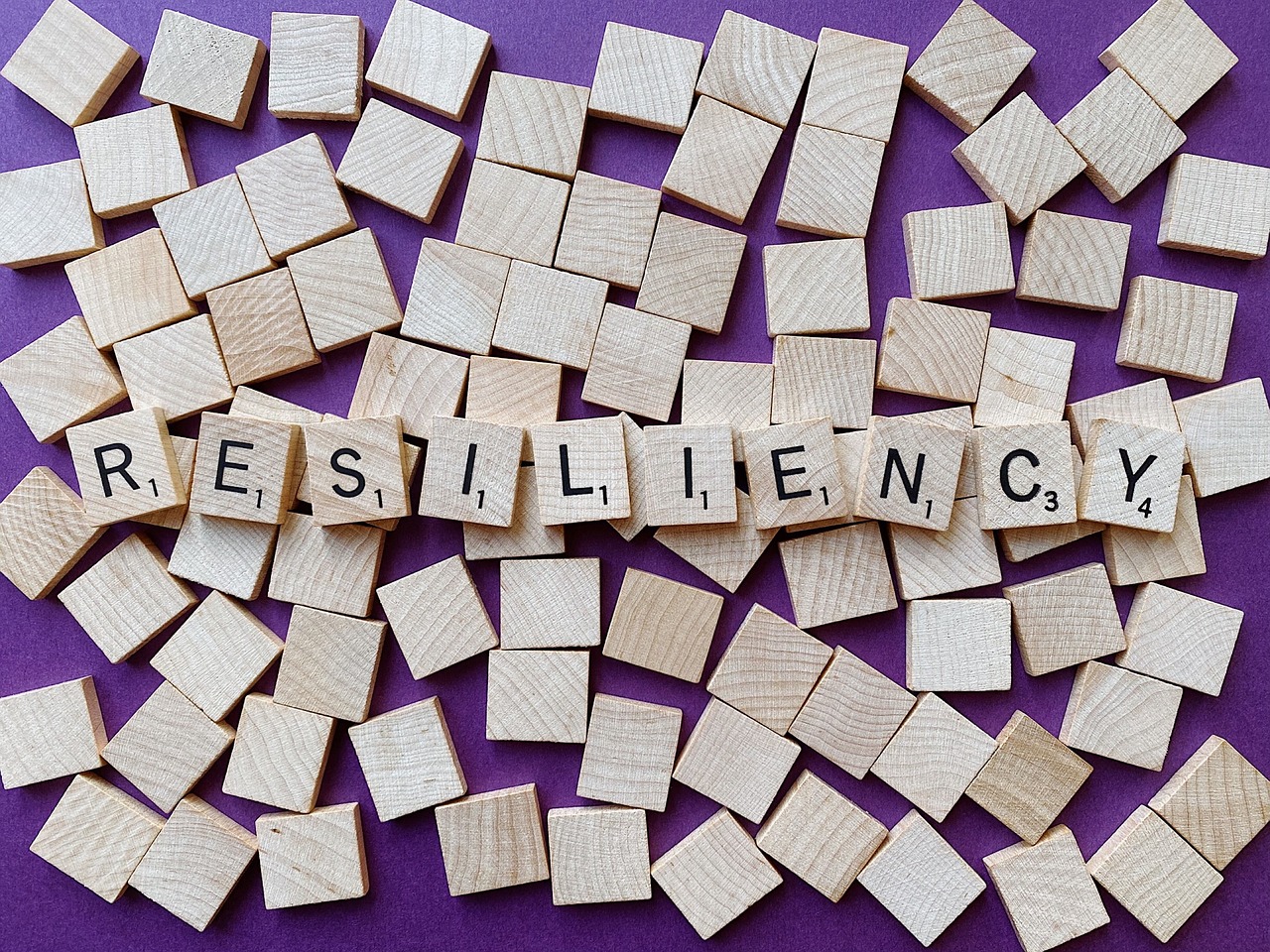
Seeking Professional Help
In a world that has been turned upside down by the pandemic, many individuals find themselves grappling with emotions that can feel overwhelming. Seeking professional help is not just a sign of weakness; rather, it is a powerful step towards recovery and resilience. Mental health professionals, such as therapists and counselors, are equipped with the tools and knowledge necessary to guide individuals through their struggles. They can provide a safe space to explore feelings, develop coping strategies, and foster a sense of hope.
One of the most significant benefits of engaging with a mental health professional is the personalized support they offer. Unlike friends or family, who may have their biases and limitations, therapists are trained to listen without judgment. They can help identify patterns in your thoughts and behaviors that you may not even be aware of. This insight can be transformative, allowing you to break free from cycles of negativity and despair.
Moreover, therapy can provide a structured approach to dealing with challenges. For instance, cognitive-behavioral therapy (CBT) has been shown to be highly effective in treating anxiety and depression. This method helps individuals recognize and change negative thought patterns, ultimately leading to improved emotional regulation. With the right guidance, you can learn how to manage stressors more effectively, paving the way for a more resilient mindset.
It's also essential to recognize that seeking help is not a one-time event. Building resilience is a journey, and mental health professionals can be your companions along the way. Regular sessions can help reinforce new skills and strategies, making it easier to navigate the ups and downs of life. As you grow more resilient, you'll find that challenges become less daunting, and you'll be better equipped to handle whatever comes your way.
In addition to traditional therapy, there are various support groups and community resources available that can complement professional help. These groups provide a sense of belonging and understanding, which can be incredibly beneficial. Connecting with others who are experiencing similar challenges can foster a sense of community and shared resilience. Remember, you are not alone in this journey.
In conclusion, seeking professional help is a vital component of building resilience in a post-pandemic world. It opens the door to growth, healing, and a more fulfilling life. If you or someone you know is struggling, don’t hesitate to reach out for help. It’s a brave step towards reclaiming your mental health and enhancing your overall well-being.
- How do I know if I need professional help?
If you find that your feelings of sadness, anxiety, or stress are interfering with your daily life, it may be time to seek help. Signs include persistent feelings of hopelessness, difficulty concentrating, or withdrawal from social activities.
- What types of therapy are available?
There are several types of therapy, including cognitive-behavioral therapy (CBT), dialectical behavior therapy (DBT), and mindfulness-based therapy. Each has unique approaches and benefits, so it’s essential to find one that resonates with you.
- How can I find a therapist?
You can search online directories, ask for recommendations from friends or family, or consult your primary care physician for referrals. Many therapists also offer virtual sessions, making it easier to find the right match.

Community Resilience
Community resilience is a powerful concept that emerged even more prominently during the pandemic. It refers to the ability of a community to withstand and recover from adverse situations, such as natural disasters, economic downturns, and, yes, global health crises like COVID-19. Think of it as a tightly-knit family that rallies together in tough times, providing support and strength to each other. The pandemic highlighted how interconnected we all are, and it’s this interconnectedness that forms the backbone of community resilience.
During the pandemic, many communities came together in extraordinary ways, showcasing their strength and solidarity. From neighborhood support groups delivering groceries to the elderly, to local businesses pivoting to provide essential services, the spirit of cooperation was palpable. This collective action not only helped individuals but also fostered a sense of belonging and purpose. When people feel they are part of something bigger than themselves, it can significantly boost their mental health and well-being.
Moreover, community resilience can be categorized into several key components:
- Social Capital: Strong relationships and networks within the community foster trust and collaboration.
- Resourcefulness: The ability to mobilize resources quickly and effectively in times of need.
- Inclusivity: Ensuring that all voices are heard and that everyone has access to support and resources.
- Adaptability: The capacity to adjust to new circumstances and challenges as they arise.
These components are not just buzzwords; they are vital for building a resilient community. For instance, when communities build social capital, they create a network of support that can be tapped into during crises. This can manifest in various ways, such as community meetings, online forums, and social media groups that keep everyone connected. The more connected a community is, the more resilient it becomes.
Additionally, the role of local leaders and organizations cannot be overstated. They often act as catalysts for resilience by organizing resources, providing information, and facilitating communication among community members. When people see their leaders actively working to support the community, it fosters trust and encourages participation. It's like having a captain steering the ship through stormy seas; the crew feels safer knowing someone is at the helm.
In conclusion, community resilience is about more than just bouncing back from adversity; it's about growing stronger together. As we navigate the post-pandemic world, it’s essential to invest in our communities. By fostering connections, promoting inclusivity, and encouraging adaptability, we can build a resilient foundation that not only withstands future challenges but thrives in the face of them.
- What is community resilience? Community resilience refers to the ability of a community to withstand and recover from adverse situations, emphasizing cooperation and support among its members.
- Why is community resilience important? It is crucial because it enhances mental health, fosters a sense of belonging, and enables communities to respond effectively to crises.
- How can individuals contribute to community resilience? Individuals can contribute by engaging in local initiatives, building relationships, and supporting one another during tough times.
- What role do local leaders play in fostering community resilience? Local leaders act as facilitators, organizing resources and communication, and inspiring trust and participation among community members.

Strategies to Enhance Personal Resilience
Enhancing personal resilience is like building a muscle; it requires consistent effort and the right techniques. In a world that has been shaken by the pandemic, developing resilience is more crucial than ever. But what does it really mean to be resilient? It's not just about bouncing back; it's about growing stronger through adversity. Here are some strategies that can empower you to cultivate resilience in your daily life.
First and foremost, mindfulness and self-care are vital. Imagine your mind as a garden; if you don’t tend to it, weeds of stress and anxiety will take over. Mindfulness practices, such as meditation, yoga, or even simple breathing exercises, can help you stay grounded. By dedicating time each day to focus on your mental and emotional well-being, you can create a sanctuary within yourself. A study by the American Psychological Association found that mindfulness can significantly reduce stress and improve emotional regulation.
Incorporating self-care routines into your life is equally important. This can range from ensuring you get enough sleep to indulging in activities that bring you joy, such as reading, painting, or spending time in nature. Think of self-care as recharging your batteries; without it, you risk running on empty. A balanced diet, physical exercise, and adequate rest form the foundation of a resilient mindset.
Another crucial element in building resilience is nurturing strong relationships. Humans are social creatures, and our connections with others play a significant role in our emotional health. Surrounding yourself with supportive friends and family can provide a buffer against stress. When you share your thoughts and feelings with trusted individuals, it not only lightens your emotional load but also fosters a sense of belonging. Consider reaching out to friends for regular catch-ups or joining community groups that align with your interests. The more you invest in these relationships, the stronger your support network becomes.
Additionally, developing a growth mindset can significantly enhance your resilience. This concept, popularized by psychologist Carol Dweck, emphasizes the belief that abilities and intelligence can be developed through dedication and hard work. When faced with setbacks, instead of viewing them as failures, see them as opportunities to learn and grow. This shift in perspective can transform how you approach challenges and can empower you to face obstacles with confidence.
Moreover, setting realistic goals can help you maintain focus and motivation. Break larger goals into smaller, manageable tasks. Each accomplishment, no matter how small, can boost your confidence and reinforce your ability to overcome challenges. Remember, progress is progress, no matter how incremental it may seem.
Finally, don't hesitate to seek professional help if you find yourself struggling. Therapists and counselors can provide invaluable support and strategies tailored to your specific needs. They can help you develop coping mechanisms and offer a safe space to explore your feelings. Remember, asking for help is a sign of strength, not weakness.
In conclusion, enhancing personal resilience is a multifaceted process that requires dedication and a proactive approach. By incorporating mindfulness, nurturing relationships, adopting a growth mindset, setting realistic goals, and seeking professional support, you can equip yourself with the tools needed to navigate life's challenges more effectively. Resilience isn’t just about surviving; it’s about thriving in a post-pandemic world.
- What is resilience? Resilience is the ability to bounce back from adversity and adapt to challenges.
- How can mindfulness practices help with resilience? Mindfulness helps reduce stress and improves emotional regulation, making it easier to cope with challenges.
- Why are strong relationships important for resilience? Supportive relationships provide emotional backing and a sense of belonging, which are crucial during tough times.
- What is a growth mindset? A growth mindset is the belief that abilities can be developed through effort and perseverance, allowing you to view challenges as opportunities for growth.
- When should I seek professional help? If you find it difficult to cope with stress or emotional challenges, seeking professional help can provide you with tailored strategies and support.

Mindfulness and Self-Care
In a world that often feels chaotic and unpredictable, especially after the upheaval of the pandemic, have emerged as essential tools for enhancing our resilience. But what exactly do these concepts mean? Mindfulness is the practice of being fully present in the moment, acknowledging our thoughts and feelings without judgment. It’s like hitting the pause button in a fast-paced movie, allowing us to appreciate the details we often overlook. On the other hand, self-care involves intentionally taking steps to nurture our physical, emotional, and mental well-being. Think of it as filling your car with gas before a long journey; you wouldn't want to run out of fuel halfway through, right?
Integrating mindfulness into our daily routine can be as simple as taking a few minutes each day to focus on our breath or engage in a short meditation. Research shows that even just five minutes of mindfulness practice can significantly reduce stress and improve our overall mood. Imagine standing in a bustling city, surrounded by noise and distractions, yet finding a serene spot within yourself that allows you to feel calm and centered. That’s the magic of mindfulness!
Self-care, while often misconstrued as indulgent or selfish, is actually a vital aspect of maintaining our resilience. It can take many forms, from physical activities like yoga and exercise to emotional practices such as journaling or talking to a friend. Here are a few self-care strategies that can help you recharge:
- Establish a routine: Create a daily schedule that includes time for self-care activities.
- Engage in physical activity: Whether it’s a brisk walk or a dance session in your living room, movement is key.
- Limit screen time: Take breaks from social media and news to reduce anxiety and overwhelm.
- Practice gratitude: Spend a few moments each day reflecting on what you are thankful for.
Moreover, combining mindfulness with self-care practices can amplify their benefits. For instance, when you engage in physical activities, try to do so mindfully. Pay attention to how your body feels, the rhythm of your breath, and the sensations around you. This not only enhances the experience but also reinforces your ability to stay grounded in the present moment.
It’s important to remember that resilience doesn’t mean we won’t face challenges or difficulties; rather, it equips us with the tools to navigate through them. By prioritizing mindfulness and self-care, we can create a strong foundation for our mental health in a post-pandemic world. Just like a tree that bends with the wind but doesn’t break, we too can learn to adapt and thrive amidst adversity.
So, why not take a moment right now to check in with yourself? Are you feeling overwhelmed? Take a deep breath, ground yourself in the present, and consider what small self-care action you can take today. Remember, resilience is not a destination but a continuous journey, and every step counts!
Q: What is mindfulness?
A: Mindfulness is the practice of being fully present in the moment and aware of our thoughts and feelings without judgment.
Q: How can I practice self-care?
A: Self-care can include activities like exercise, meditation, journaling, and spending time with loved ones.
Q: Why is resilience important?
A: Resilience helps individuals cope with stress and challenges, allowing them to bounce back and thrive in difficult situations.
Q: Can mindfulness improve mental health?
A: Yes, studies show that mindfulness can reduce stress, anxiety, and depression, promoting overall mental well-being.
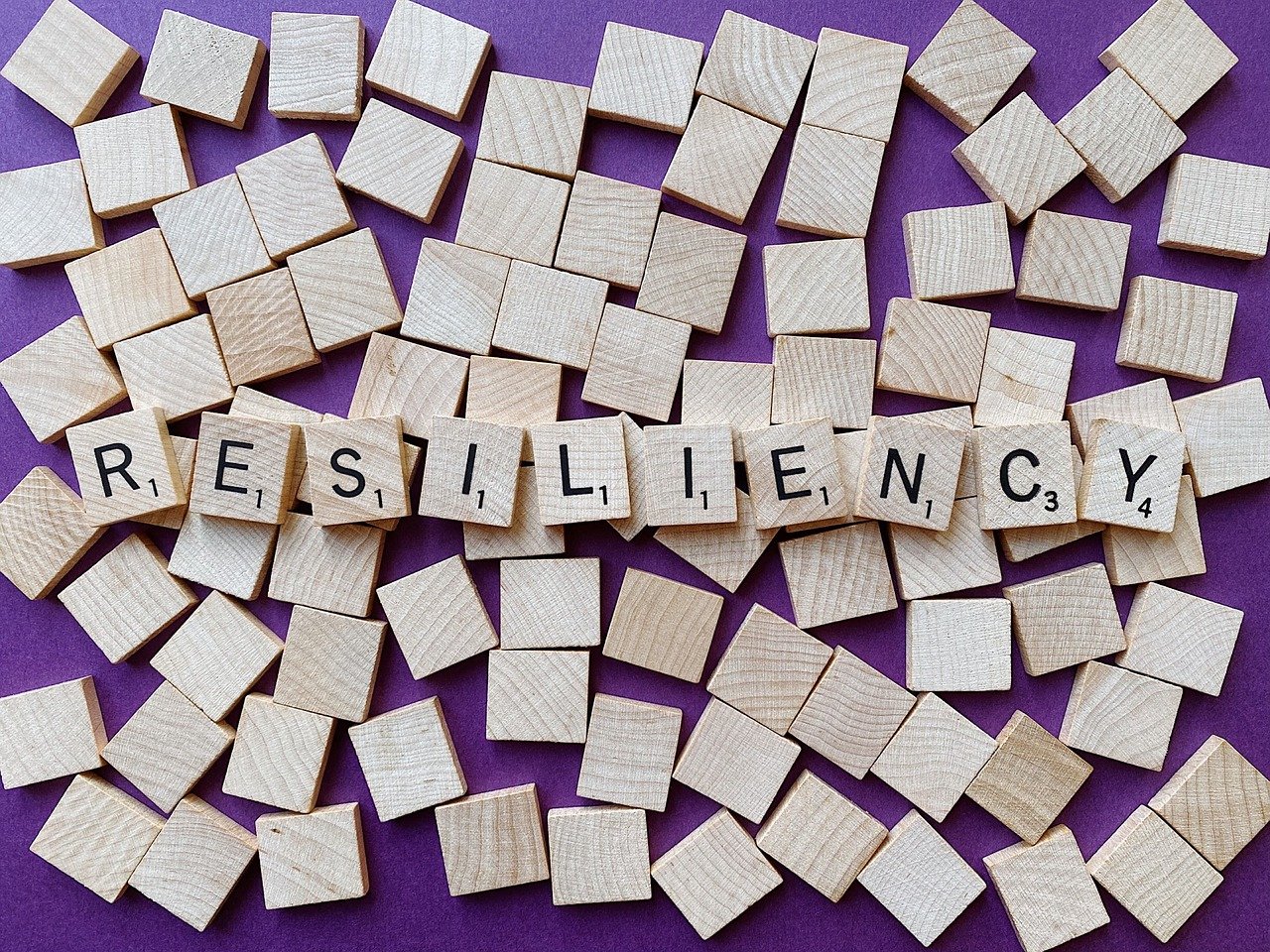
Building Strong Relationships
In a world that often feels disconnected, especially after the challenges of the pandemic, has never been more crucial. Think of relationships as the threads that weave the fabric of our lives; when these threads are strong, they create a beautiful tapestry of support, love, and resilience. But how do we go about strengthening these vital connections?
First and foremost, communication is key. It’s not just about talking; it’s about listening and engaging in meaningful conversations. When you genuinely listen to someone, you make them feel valued and understood. This can be as simple as asking a friend how their day was and really paying attention to their response. It’s in these small moments that we build the foundation for deeper connections.
Moreover, vulnerability plays a significant role in fostering strong relationships. Sharing your thoughts and feelings, even the messy ones, can create a safe space for others to do the same. It’s like opening a window to your soul; when you let others see in, they are more likely to reciprocate. This mutual sharing can lead to a profound sense of trust and intimacy.
Another essential aspect is the quality of time spent together. In our fast-paced lives, it’s easy to let relationships fall by the wayside. However, prioritizing time together, whether it’s through regular catch-ups, game nights, or even simple walks, can significantly strengthen bonds. Remember, it’s not always about the quantity of time but the quality. Engaging in activities that both parties enjoy can create lasting memories and deepen your connection.
It’s also important to recognize that relationships require effort. Just like a garden, they need nurturing to thrive. This means being there for each other during tough times, celebrating successes, and showing appreciation regularly. A simple “thank you” or a compliment can go a long way in making someone feel cherished.
Lastly, don’t underestimate the power of community. Surrounding yourself with supportive friends and family creates a network of resilience. When you have a solid support system, you’re more equipped to handle life’s challenges. Communities that come together to support one another can create a ripple effect of positivity and strength, making it easier to navigate the post-pandemic world.
In summary, building strong relationships is about open communication, vulnerability, quality time, effort, and community support. By focusing on these aspects, you not only enhance your own resilience but also contribute to a more connected and supportive world around you. So, let’s take the time to invest in our relationships and watch as they flourish!
- Why are strong relationships important for resilience?
Strong relationships provide emotional support, helping individuals cope with stress and adversity more effectively. - How can I improve my communication skills?
Practice active listening, ask open-ended questions, and engage in conversations regularly to enhance your communication skills. - What activities can strengthen my relationships?
Engaging in shared hobbies, having regular catch-ups, and being present during important moments can strengthen your bonds. - How do I create a supportive community?
Be proactive in reaching out to others, participate in community events, and foster an environment of trust and encouragement.
Frequently Asked Questions
- What is resilience, and why is it important in a post-pandemic world?
Resilience is the ability to bounce back from adversity and challenges. In a post-pandemic world, it plays a crucial role in helping individuals and communities navigate the complexities and uncertainties that arise from such significant disruptions. It enables us to adapt, recover, and thrive despite challenges, making it a vital skill for mental well-being.
- How has the pandemic impacted mental health?
The pandemic has led to increased levels of stress, anxiety, and depression worldwide. Many people have faced isolation, loss, and uncertainty, which can take a toll on mental health. Resilience helps mitigate these effects by providing coping strategies and fostering a mindset that promotes emotional recovery and stability.
- What are some effective coping mechanisms for building resilience?
Some effective coping mechanisms include practicing mindfulness, engaging in regular physical activity, maintaining a healthy diet, and establishing a routine. Additionally, journaling, connecting with loved ones, and seeking professional help when needed are essential strategies that can enhance resilience and emotional regulation.
- Why is seeking professional help important for resilience?
Professional support, such as therapy and counseling, can provide individuals with tools and techniques to build resilience. Mental health professionals can help identify underlying issues, teach coping strategies, and offer a safe space for individuals to express their feelings, which is crucial for recovery and growth.
- How can communities foster resilience during crises?
Communities can foster resilience by creating supportive environments that encourage collaboration, open communication, and shared resources. Initiatives such as community support groups, local mental health programs, and volunteer opportunities can strengthen social ties and promote collective healing, making the community more resilient as a whole.
- What role do strong relationships play in enhancing resilience?
Strong social connections are essential for resilience as they provide emotional support, encouragement, and a sense of belonging. Nurturing relationships with family, friends, and peers can help individuals feel less isolated and more equipped to handle life's challenges, ultimately enhancing their overall well-being.
- What mindfulness practices can help improve resilience?
Mindfulness practices such as meditation, deep breathing exercises, and yoga can significantly improve resilience. These practices help individuals stay grounded, reduce stress, and enhance emotional regulation, enabling them to respond more effectively to challenges and setbacks.

